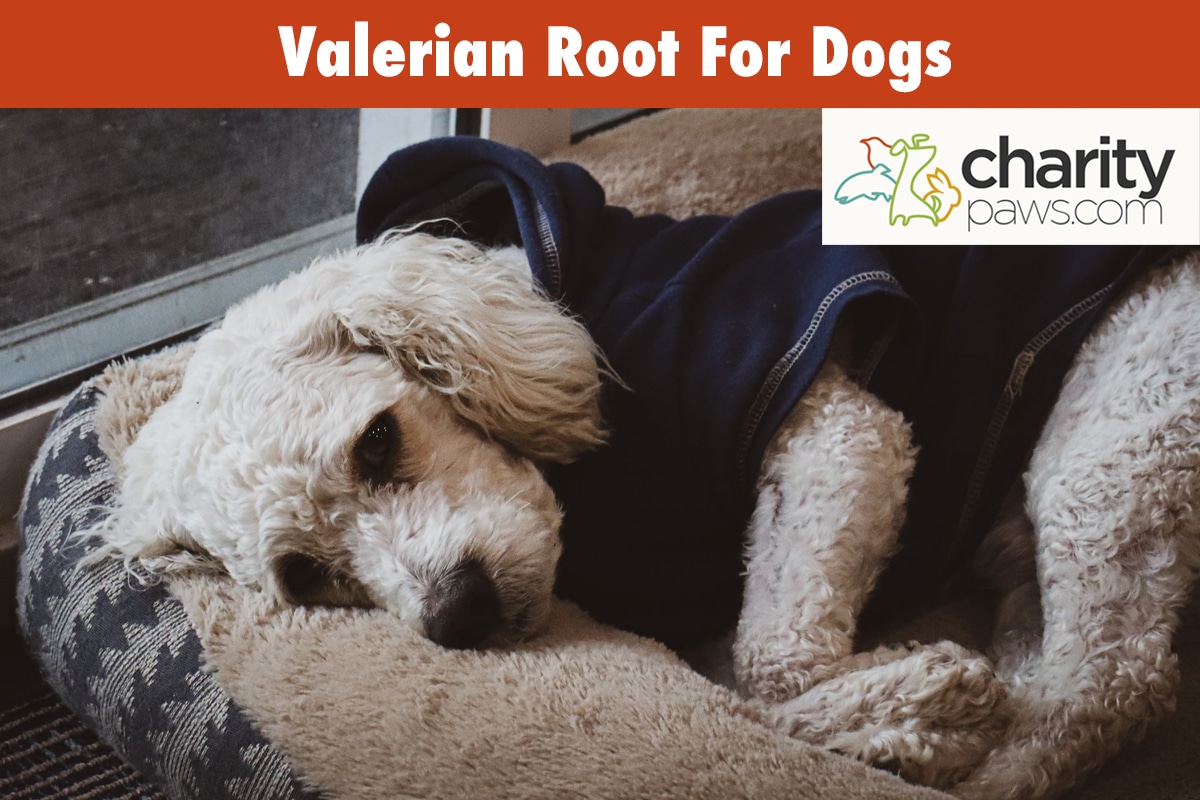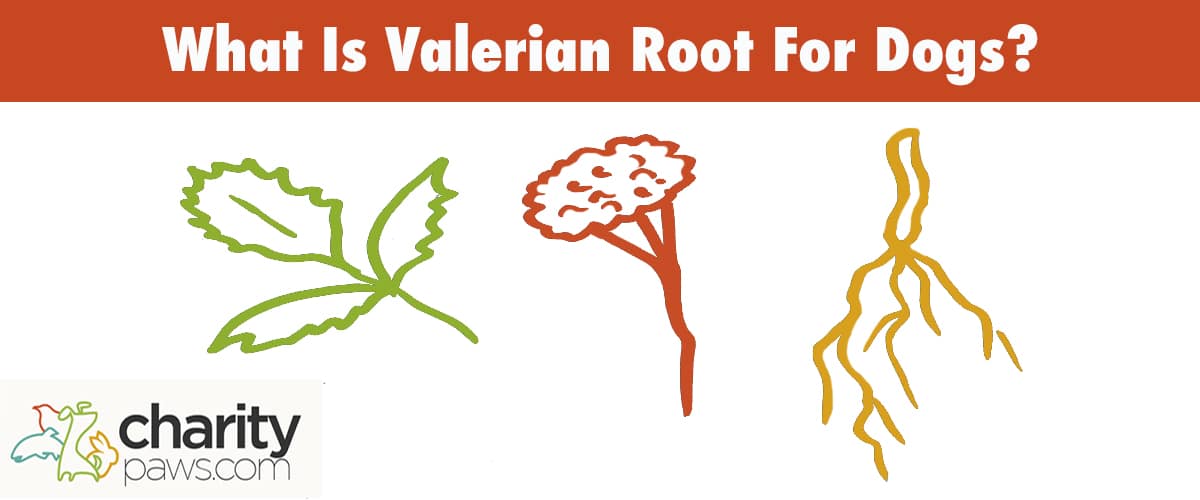If you have an anxious canine friend in your home, you may have heard of valerian root.
Valerian root is said to be a natural sedative for dogs, helping to combat multiple forms of canine anxiety.
Though it was originally marketed to help insomnia in humans, can this herb be used in our furry friends as well?
In this article we will introduce you to the details of valerian root use, and help you determine if this herb is the right fit for your canine companion.
Before we get into the article, we should first state that we do not suggest giving your dog Valerian root without veterinary approval.

What Is Valerian Root For Dogs?
Valerian, or Valeriana officinalis, is a plant native to both Asian and European countries.
The Valerian plant contains a substance known as valerenic acid, and this substance is believed to increase the GABA receptor response in the brain.
The GABA receptors are believed to play a role in controlling fear and anxiety in both humans and animals, so this could be why Valerian offers a mild sedative effect.
Research is still ongoing for Valerian use in humans and it is virtually non-existent in dogs.
This is why all comments from experts are based mainly on the effect this herb has on the human brain, as well as on the results they have personally seen in their patients.
Uses Of Valerian Root In Dogs
As we mentioned above, there are not yet a sufficient number of studies to prove the effectiveness of valerian root use in dogs.
However, based on anecdotal evidence and the effect on the human brain, experts can suggest ways in which the herb may help our furry friends.
The first potential use of Valerian root in dogs is offering mild sedation during stressful events.
This can include trips to the vet, during loud thunderstorms, and even when you have new people stopping by your home.
While this will not properly sedate your pup to the point of sleeping, it can potentially take the edge off their anxiety.
Some experts also believe that Valerian root use in dogs can limit excessive vocalizations in a stressful setting.
These professionals claim that Valerian root decreased barking amounts in a crowded shelter, and was offered by spraying their bedding with the relaxing herb.
This is widely debated, but some experts believe Valerian root may help to limit seizures in epileptic dogs.
Though it should not be used as stand alone seizure control, it may be able to limit breakthrough seizures in dogs that are currently being treated for a seizure disorder.
It’s important to note that there are no peer reviewed or published studies on Valerian root use in dogs, so these uses are purely anecdotal.
Side Effects Of Valerian Root In Dogs
As we have mentioned throughout the article, official research on valerian use in dogs has not yet been completed.
Due to this, potential side effects are based on the response both dog owners and vets have noted over the years.
Some of the potential side effects of Valerian root in dogs include:
- Drowsiness
- Lethargy
- Nausea
- Vomiting
- Dizziness
- Excitability
- Hypersensitivity to stimuli
In addition to the potential side effects that this herb can cause, there are a few potential drug interactions that all dog owners should be aware of.
Valerian root should not be given to dogs currently taking antifungal or anti-seizure medication without veterinary guidance, as this can put your dog at risk of additional side effects or increased sedation.
It does not mean that your dog cannot take the herb, but that you simply need to follow the guidance of your veterinarian.
We also do not recommend giving Valerian root to a pregnant dog, as this may have a toxic effect on the puppies.
There are no studies on this topic, but it is always best to be safe in these situations.
Another thing to keep in mind is how important it is to tell your vet that your dog is currently taking Valerian before they prescribe any new medication.
While you should always disclose any supplements your pup is currently taking to your vet, it is especially important in this situation.
How To Give Your Dog Valerian Root
If your vet approved the use of Valerian root for your pup, there are a few different ways to offer the herb to your canine friend.
The easiest way to do this is by giving your pup a tasty treat or chew that is already infused with the supplement, as this will eliminate the need to calculate your dog’s dose.
These treats offer clear instructions on their packaging, so there will be no confusion going forward.
If you would rather offer your dog pure Valerian root without any added fluff, there are other forms of the herb that you can offer with veterinary approval.
You can find this herb in the form of a pill, powder, and even an oil.
Just be sure to ask your vet about specific dosing for your dog, as these options tend to be more concentrated.
Valerian Root Dosage For Dogs
Due to the fact that Valerian root for dogs can come in many forms, the instructions for dosing can range from product to product.
This is why it is so important to get specific dosing from your vet, as you can increase potential side effects in your dog by offering them too concentrated of a dose.
Though we always suggest speaking with your vet, there are some general guidelines for Valerian dosing based on the form you are offering.
Powders should typically be offered in doses of ¼ to ½ a teaspoon daily, oils can typically be given in doses of 5-10ml per day, and Valerian chews and treats should be given according to directions on the packaging.
Dogs come in an array of shapes and sizes, meaning each dog could have a slightly different dose.
Not only can their dosing vary based on your dog’s weight, but it can also vary based on the severity of your dog’s anxiety.
Again, this is why your dog’s dose should be determined by your vet.
Can A Dog Overdose On Valerian Root?
Valerian root toxicity and overdose in dogs is extremely rare, but it can happen.
Though most high doses will not have a life threatening impact, it can lead to extreme sedation and disorientation for your dog.
Dogs that receive too high of a dose may experience:
- Lethargy
- Extreme sedation
- Unsteadiness
- Nausea
- Vomiting
Increased sedation is more likely in dogs that are already taking a medication with a sedative effect, as this can further impair them when the two substances combine.
Should I Give My Dog Valerian Root?
At the end of the day, it is up to you and your veterinarian to determine whether or not your dog can benefit from Valerian root.
Valerian root can be a wonderful addition to an anxious dog’s life, especially if you are not yet ready to offer any prescription sedatives.
If your dog’s anxiety is having a negative impact on their life, it may be worth discussing Valerian root use with your veterinarian.

Final Thoughts On Valerian Root For Dogs
Valerian is a plant flower that can have a beneficial impact on both humans and canine companions.
As long as you get approval from your dog’s veterinary team, this natural herb may be able to offer your dog some much needed relief from their anxiety.

